Case Study Presentation
- A 33-year-old woman comes to the clinic.
- Her chief complaint includes irregular periods, severe acne, and frequent hair loss.
- Health problems began about one year ago.
- She denies voice changes.
- Blood tests prove a high hormone level.
A 33-year-old African-American woman visits the clinic because of her acne and hair loss have worsened during the last several months. She reports on her irregular periods during the last year. From time to time, she cleans her face to remove several acnes. Today, she has more than 20 dark spots on her skin. She is also concerned about her inability to stop hair loss. She was adopted, and she does not know her genetic history except the fact that her birth-mother had type 2 diabetes. She does not observe voice changes. She does not have children, and she is not married (no serious relationships). The results of the blood test show a high level of androgens. A pelvic examination proves increased ovaries. Polycystic ovary syndrome is the diagnosis.
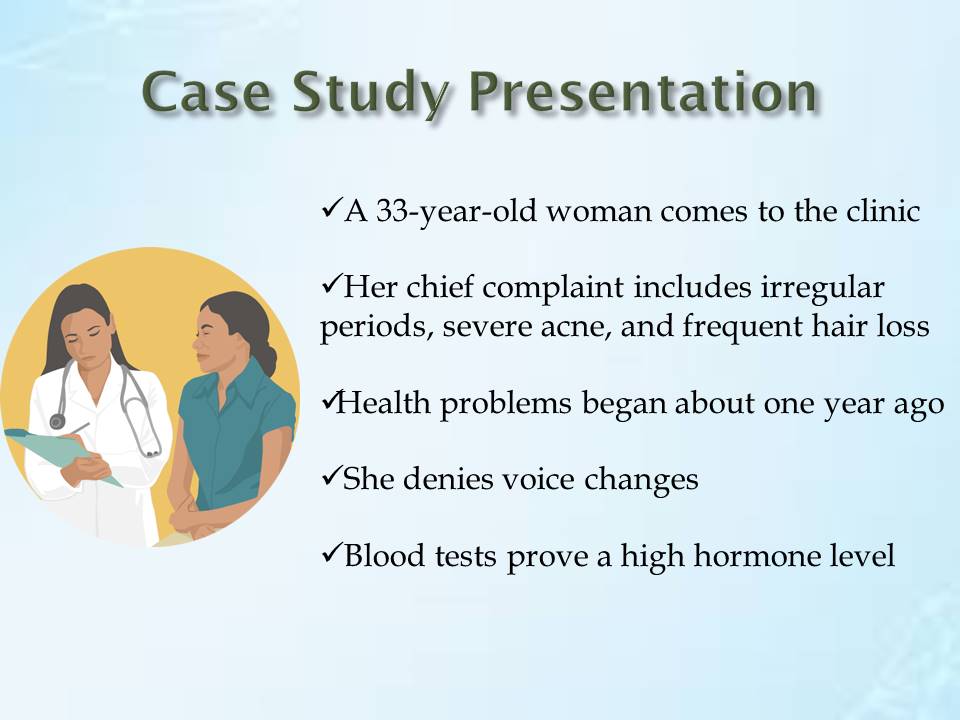
Medical Management
- Anti-androgens – Aldactone – to control the level of androgens.
- Anti-estrogen – Clomid – to increase the ovulation rate.
- Anti-diabetic – Metformin – to prevent hyperglycemia.
Polycystic ovary syndrome (PCOS) is a hormonal type of disorder that is observed among women of reproductive age. It is characterized by irregular periods, the excess of male hormones, and polycystic ovaries (Sirmans & Pate, 2014). Every medication has to be prescribed by a professional only after all necessary tests are made, and the diagnosis is proved (Dreischulte & Guthrie, 2012). In addition to lifestyle changes, medications have to be prescribed. They help to control the level of androgens (anti-androgens), promote anti-estrogen therapy (clomiphene citrate), and slow down the progression of diabetes (anti-diabetic agent). No side effects are observed as a result of the interactions between the drugs in the chosen medication approach.
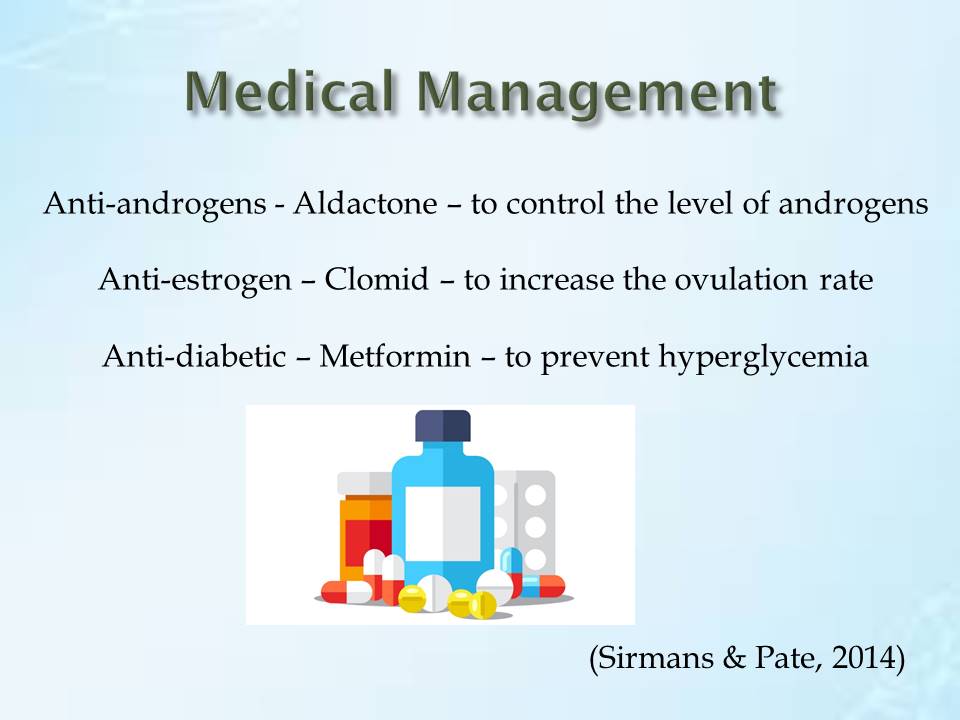
Drug One: Aldactone (Spironolactone)
- Dosage: 50 mg daily.
- Mechanism of Action: receptor binding.
- Adverse Effects: nausea, breast tenderness, hyperkalemia.
- Contraindications: anuria, renal function impairment.
- Interactions: ACE inhibitors, digoxin, corticosteroids.
Aldactone is known by its generic name Spironolactone. It is prescribed to patients with PCOS to stabilize the level of androgens. This tablet is usually prescribed in dosage between 25 and 200 mg per day (Williams, Mortada, & Porter, 2016). It may be taken with food. As one of the main antagonists of aldosterone, this drug aims at receptors’ binding. It increases the amount of water and sodium and acts as a diuretic by its mechanism. The most serious adverse effects include nausea, breast tenderness, and hyperkalemia. It is not recommended for patients who have anuria or renal function impairment. The interactions with various ACE inhibitors, digoxin, and corticosteroids may lead to severe complications.
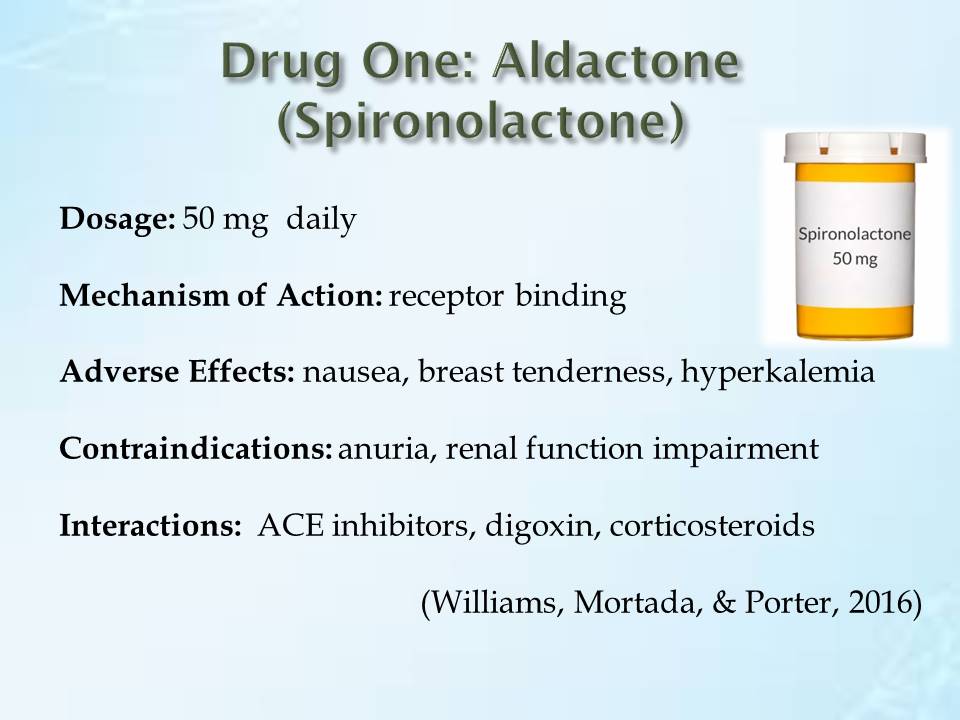
Drug Two: Clomid (Clomiphene Citrate)
- Dosage: 50 mg daily.
- Mechanism of Action: release of gonadotropins.
- Adverse Effects: blurred vision, nausea, headaches.
- Contraindications: cancer, depression, thyrotoxicosis, pregnancy.
- Interactions: not documented.
Clomid is the brand or trade name of Clomiphene Citrate. This drug is used to promote ovulation induction among women who suffer from PCOS (Sirmans & Pate, 2014). Due to estrogenic and anti-estrogenic properties, Clomid has the function to release gonadotropins and other hormones that may lead to mutations and ovulation. Blurred vision, nausea, and headaches are the main adverse effects of the chosen drug. Women who have cancer or thyrotoxicosis, suffer from depression, or are pregnant should avoid using Clomid. Though its interactions with other drugs remain open for discussions and research (Williams et al., 2016), its use has to be approved by a doctor.
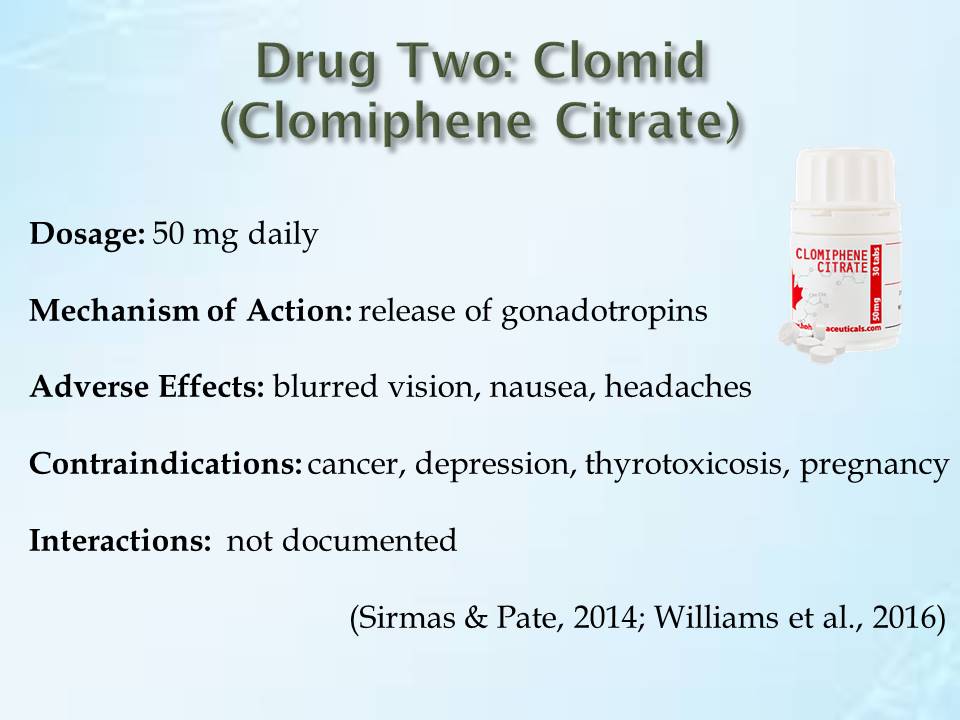
Drug Three: Metformin (Glumetza)
- Dosage: 1,500-2,250 mg daily.
- Mechanism of Action: glucose tolerance.
- Adverse Effects: nausea, diarrhea, hypoglycemia.
- Contraindications: renal failure, hydrochloride sensitivity.
- Interactions: glyburide, furosemide, digoxin.
The peculiar feature of metformin is that it is both a generic and brand name of the drug. However, the trade name Glumetza can also be found. It is an insulin-sensitizing agent that promotes glucose tolerance in diabetic and pre-diabetic patients. It can decrease the intestinal absorption of glucose and improve insulin sensitivity. Its recommended dose is between 1,500 mg and 2,250 mg daily (Williams et al., 2016). Though the properties of this drug are effective in dealing with insulin resistance, such adverse reactions as nausea, diarrhea, and hypoglycemia cannot be ignored. The patient should be informed about such contraindications as renal failure or sensitivity to hydrochloride. Interactions with such drugs as glyburide, furosemide, and digoxin should be avoided because such a combination can result in zero treating effect.
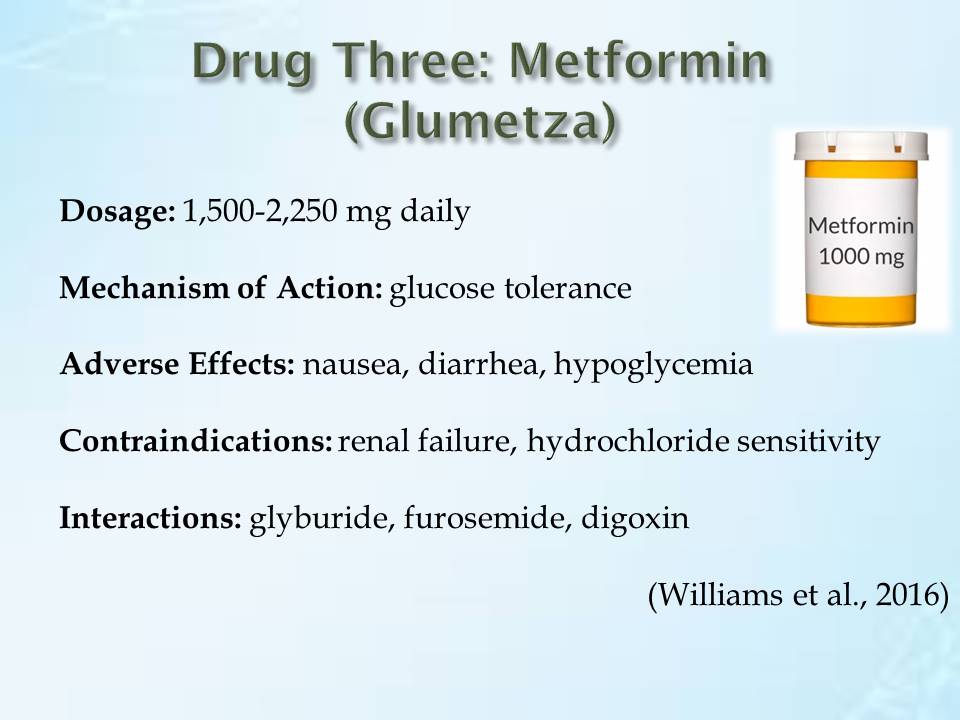
Alternative Therapies
- Healthy eating.
- Physical exercises.
- Acupuncture.
- Vitamin D.
- Herbal interventions.
PCOS patients may also address alternative medicine and choose a therapy that meets their interests, cultural values, and traditions. This type of disorder is characterized by multiple changes in the body and makes a woman choose the most appropriate option for her health but never personal demands. Therefore, alternative medicine may be an effective solution for patients with PCOS. For example, healthy eating and physical exercises can be offered on a regular basis. Acupuncture and Vitamin D therapy can help to deal with insulin sensitivity. Finally, herbal interventions including the tablets with Galega officinalis or Tribulus terrestris can be chosen (Arentz et al., 2017). Still, official approval and pre-treatment assessment are required to make sure that such alternatives are not harmful to the patient.

Evidence-Based Support
- Arentz et al. (2017): Herbal therapies for PCOS patients.
- Dreischulte & Guthrie (2012): Medication safety.
- Legro et al. (2013): Diagnosis and treatment of PCOS.
- Sirmans & Pate (2014): Medication management for PCOS.
- Williams et al. (2016): PCOS clinical guidelines.
Treatment of PCOS is a significant task for many medical and healthcare facilities. It is not enough to diagnose a patient and offer several treatment options. It is more important to give clear explanations, develop trustful relationships, and demonstrate care and support. Arentz et al. (2017) investigate alternative treatments that can be offered to PCOS patients. They focus on herbal therapy and explain how infertility can be treated. Research by Dreischulte and Guthrie (2012) helps to clarify the basics of medication management and introduce a safe and effective pharmacological care plan. Lergo et al. (2013) discuss various diagnostic and treatment tools for PCOS patients, categorizing the stages of the disease and including possible co-morbid diseases. Sirmas and Pate (2014) introduce effective medication management for PCOS, focusing on all heterogeneous endocrine characteristics of the disease. Finally, Williams et al. (2016) explain available medications and dosages to treat all symptoms of PCOS.
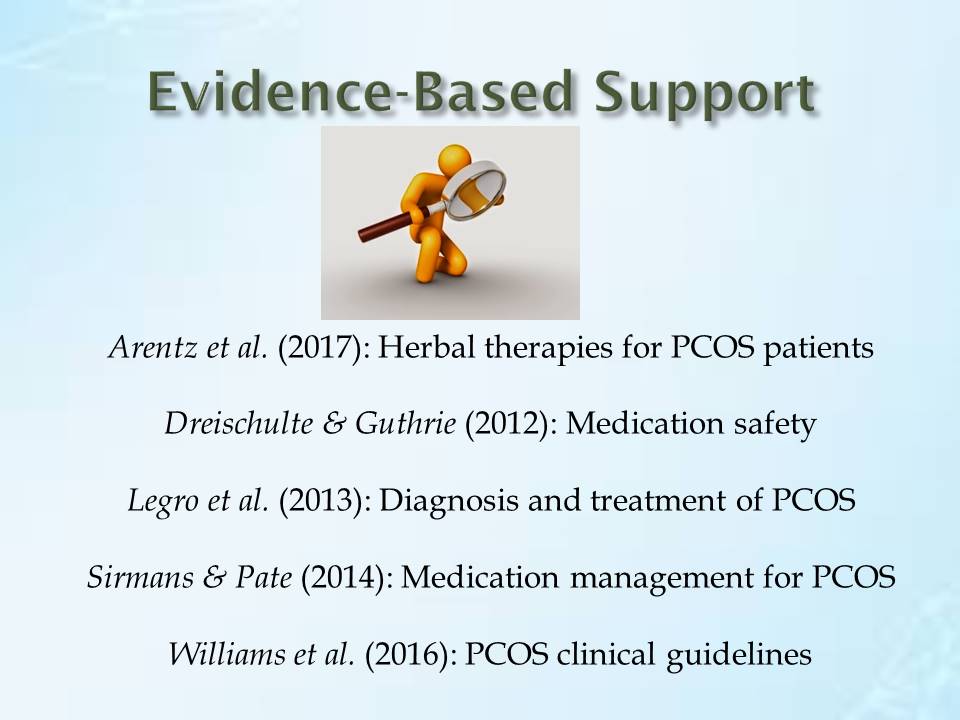
Barriers to Practice
- Collaboration in medication management
- Interprofessional communication
- Healthcare literacy
- State and federal laws and policies
- Cultural Diversity
Drug prescription does not usually take much time. Still, its outcomes and necessary preparations play a more important role. This process is also challenged by a number of barriers that may be related to a disease process. PCOS patients and healthcare professionals who have to work with them have to consider such issues as medical management collaboration, interprofessional communication, state/federal laws and policies, cultural diversity, and healthcare literacy (Dreischulte & Guthrie, 2012). Collaboration in medication management can be a problem because of the necessity to take several drugs at the same time. To make the right choice, clinicians have to communicate. Unfortunately, because of not strong enough healthcare literacy, patients fail to understand the importance of each element of the offered therapy. In addition, state and federal laws may prevent the development of PCOS research. Today, many US policymakers and lawmakers are interested in promoting the awareness of PCOS among the population. However, the threat of cultural diversity cannot be ignored because the USA is a multicultural country with a number of immigrants and communities being created.

Cultural Diversity
Medication management is culturally biased:
- Infertility is not acceptable
- Extreme hair growth or loss should be controlled
- Contraception is not always allowed
- Readiness to share the diagnosis with others
Culture may be a significant barrier to medication management of PCOS. There are many issues in dealing with some groups of people that can promote misconceptions about human cultural beliefs. PCOS is the disease that makes women unable to have children, and infertility can be a shame for some cultures. The presence or absence of hair is another concern. In civilized countries, women have to shave legs, hands, and face (in case of emergency). Urban citizens may avoid such procedures. Even the use of contraceptive pills as a part of anti-PCOS therapy can be an issue for some cultures. Contraception remains a taboo in many nations. Finally, not all people can receive psychological help because of the inability to share their health problems and diagnosis. Medication is challenged because of poor communication and collaboration between cultures.
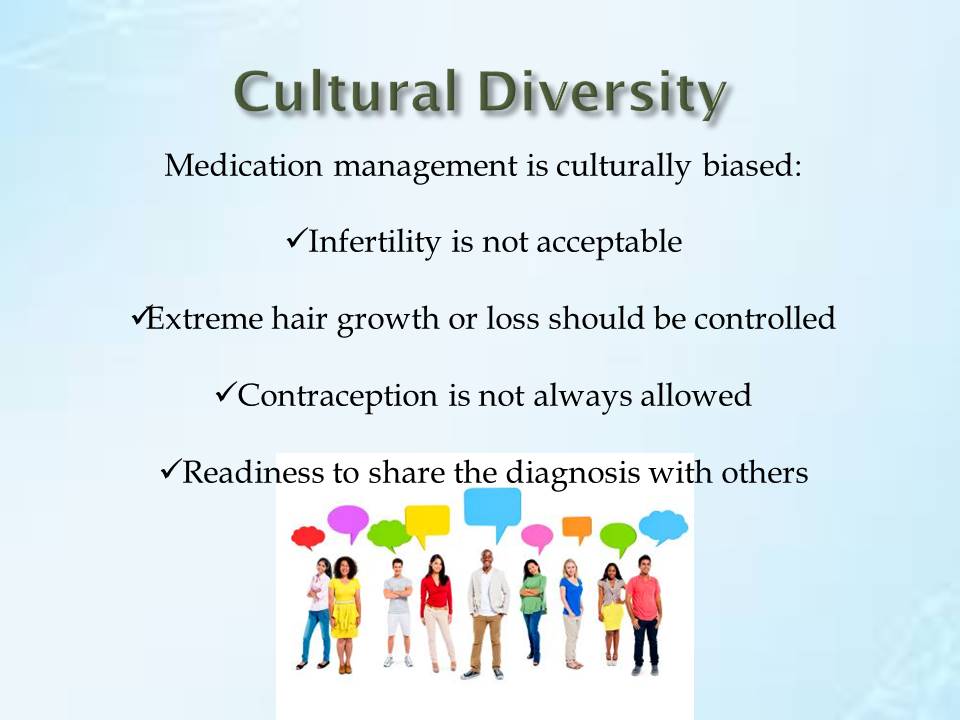
Healthcare Literacy
- PCOS is a gender-related disorder
- 4-8% of women suffer from PCOS
- 40% of women cannot have children because of PCOS
- Family history is a risk factor
- PCOS is a medically treated disease supported by personal goals
Regarding medication management for PCOS patients, healthcare literacy is not as properly developed as it should be. The reasons for such barrier may be such a factor as its gender-related nature or a small percentage of cases. Only 4-8% of women have PCOS and receive treatment according to the diagnosis given (Sirmas & Pate, 2014). Despite the fact that PCOS is the reason for why about 40% of women who cannot have babies, not much attention is paid to its prevention and management (Legro et al., 2013). Family history is another issue that influences healthcare literacy. Not many family members are ready to discover their PCOS-related problems and use this information during wellness check-ups. Finally, PCOS is the disease that can be treated with the help of medications and pharmacologic therapies. Still, many patients and medical workers neglect the role of personal motivation and needs in such a care plan.
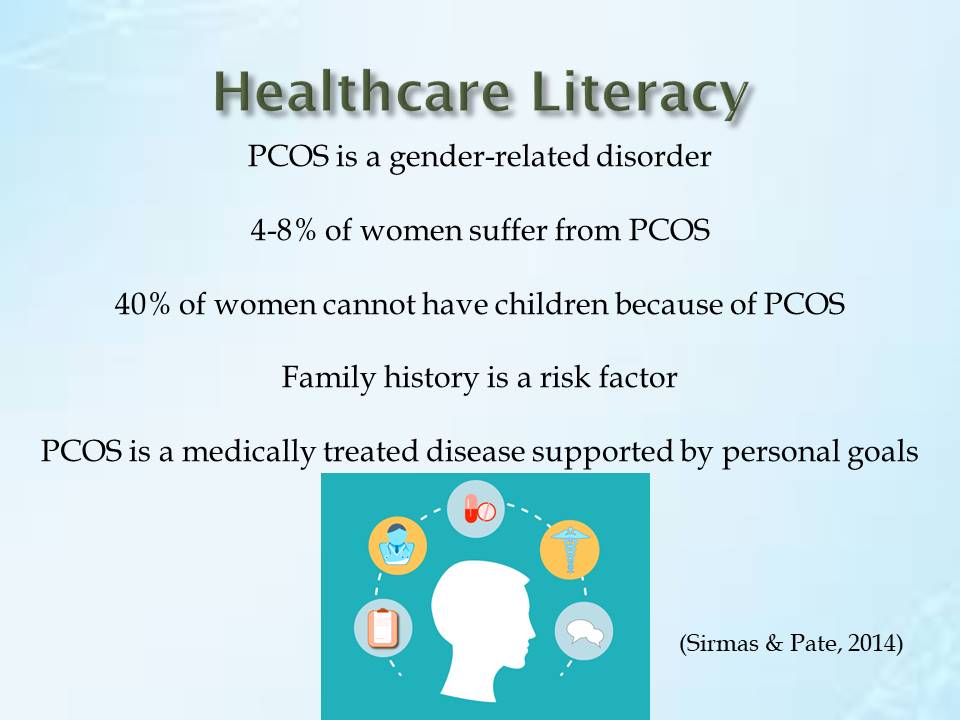
Identifying Outcomes
- Follow prescriptions
- Avoid diabetic complications
- Achieve a complete recovery from PCOS
- Improve healthcare literacy
- Communicate about personal problems
If the patient follows the medication treatment plan offered, she has all chances to avoid diabetic complications that are connected to her family history. In addition, PCOS can be treated in about a half month in case the dosage and schedules are followed. Finally, healthy eating and lifestyle can become significant contributions to a complete recovery for the patient. Medication and healthcare literacy must be improved at the community and state levels to make sure that all women are prepared to have such hormonal disorder and aware of how to deal with it at its early stage.
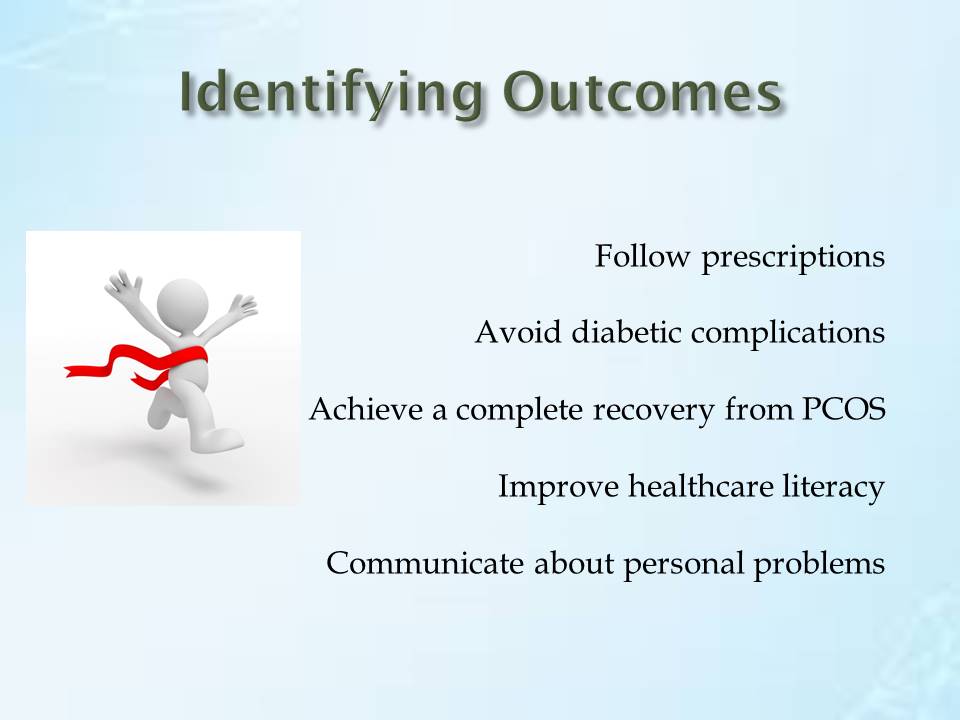
Test Questions
TRUE or FALSE statements:
- Polycystic ovary syndrome is frequently observed among men and women.
- False – it is a female hormonal disorder.
- Polycystic ovary syndrome is one of the leading causes of death among the US population.
- False – it is characterized by certain health complications, but can hardly lead to death.
- Metformin can be combined with Clomid to treat diabetes.
- False – the combination of these drugs can be used to treat PCOS but not diabetes.
- Cultural diversity prevents effective medication management among PCOS patients.
- True – cultural diversity is a barrier to medication management of PCOS.
- Polycystic ovary syndrome treatment can be improved through increased healthcare literacy.
- True – poor healthcare literacy is still defined as a barrier to effective treatment of PCOS.
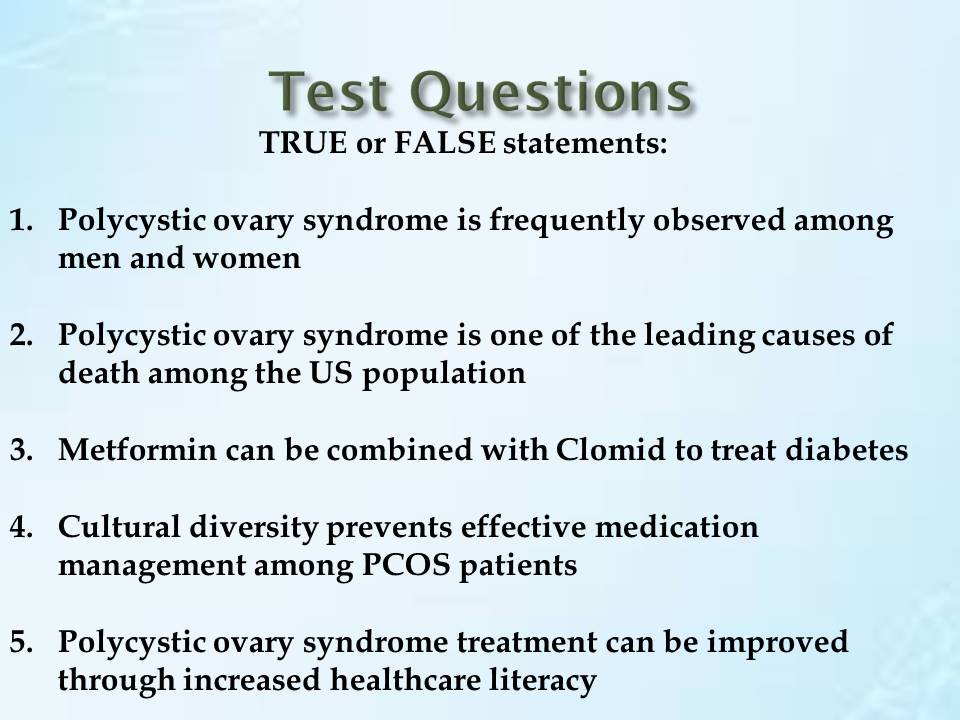
References
Arentz, S., Smith, C. A., Abbott, J., Fahey, P., Cheema, B. S., & Bensoussan, A. (2017). Combined lifestyle and herbal medicine in overweight women with polycystic ovary syndrome (PCOS): A randomized controlled trial. Phytotherapy Research, 31(9), 1330-1340.
Dreischulte, T., & Guthrie, B. (2012). High-risk prescribing and monitoring in primary care: How common is it, and how can it be improved? Therapeutic Advances in Drug Safety, 3(4), 175-184.
Legro, R. S., Arslanian, S. A., Ehrmann, D. A., Hoeger, K. M., Murad, M. H., Pasquali, R., & Welt, C. K. (2013). Diagnosis and treatment of polycystic ovary syndrome: An endocrine society clinical practice guideline. The Journal of Clinical Endocrinology & Metabolism, 98(12), 4565-4592.
Sirmans, S. M., & Pate, K. A. (2014). Epidemiology, diagnosis, and management of polycystic ovary syndrome. Clinical Epidemiology, 6, 1-13.
Williams, T., Mortada, R., & Porter, S. (2016). Diagnosis and treatment of polycystic ovary syndrome. American Family Physician, 94(2), 106-113.